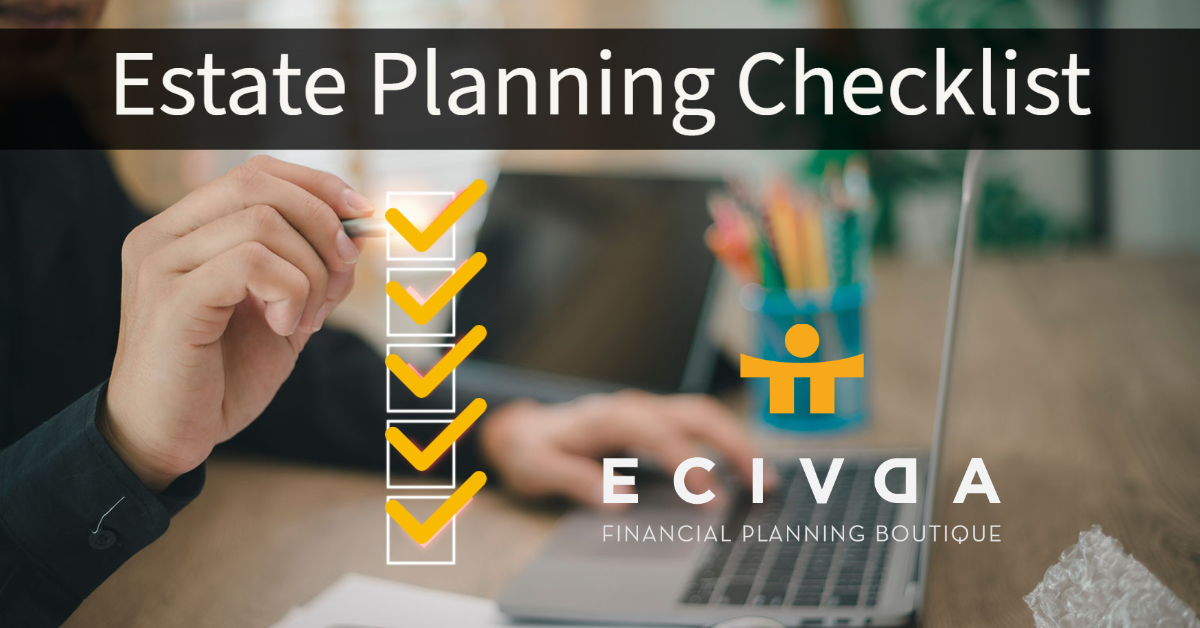Estate Planning Checklist
While uncomfortable to think about, effectively planning ahead for when you are no longer here can save your loved ones a great deal of time, money, and emotional hardship. Estate planning can be complicated, but there are some basic “must-do’s” that should be regularly updated and reviewed. Below is a simple checklist for making sure your estate plan is up to date.
What You Need to Know
Wills
- Have you created a will?
- Is it updated and current?
- Have you experienced any major life changes since the will was created? This could be a new marriage, divorce, child, death in the family, etc.
Wills should be created with the guidance of an estate lawyer to ensure that your final wishes are correctly documented and carried out. It is vital that a will be regularly updated as it acts as the foundation of your estate plan.
Beneficiaries
- Do all your registered investments have a named beneficiary? This includes RRSP, RDSP, RESP, TFSA, Pension Plans, and Segregated Funds.
- Do all your life insurance policies have a named beneficiary?
- Have you recently reviewed your beneficiaries? Has there been a major life changes such as a marriage or divorce that could warrant a change to your beneficiary appointment?
Beneficiary designations allow for assets to bypass probate (in most cases) and be passed directly to your beneficiary. This is a great money and time saver.
Dependents
- Do you have a family member that you wish to provide an income to after your death?
- Do you have family members that you wish to fund an education for after your death?
- Do you have any family members that have special psychological or physical needs that you would like to provide financial support for?
- Do you have a parent or other relative that you wish to ensure is taken care of financially if you die prematurely?
There are a variety of different financial and legal tools available to Canadians that can help them provide income or support for their dependents when they are gone. Keeping your dependents updated in your will is important as they may change throughout your lifetime.
Executors
- Have you named an Executor of your will?
- Is the Executor up to date? Have you named an alternate Executor in the event your first choice is unable to fulfill the position?
- Has your Executor been made aware of their appointment and been briefed on your final wishes?
An Executor is someone you appoint in your will that will be responsible for administering your estate. An Executor should be someone you trust and also someone who is capable of dealing with the potentially complex responsibilities involved with administering an estate.
Powers of Attorney
- Have you appointed a Power of Attorney for Property? This person will be able to help you with your finances and personal property in the event you are unable to do so yourself.
- Have you appointed a Power of Attorney for Personal Care (Health)? This person will be responsible for making medical and personal care decisions for you if you become unable to act on your own.
- Are you POA’s aware of their appointment and willing/capable to perform the tasks that will be required of them?
Power of Attorney is a legal document that allows you to appoint someone to help you with your finances and personal care in the event that you feel unable to do so or become mentally incapable.
Financial Planning
- Have you spoken to your financial advisor about structuring your assets in the most tax efficient way to minimize estate taxes and probate fees?
- Have you set aside enough money to cover final expenses, estate taxes, probate fees, and funeral arrangements?
- If you own a business, have you worked with your professional team of advisors to develop a succession plan?
- Have you recently taken the time to calculate your final expenses and potential estate taxes?
- Have you addressed any permanent insurance needs you may have?
- Have you spoken to your advisor about your wishes to make a charitable donation before/after your death?
Your financial advisor will play a significant role in helping you prepare your estate. The above questions are only some of the issues that you may want to bring up to your financial advisor so that they can help you make your estate as efficient as possible.
Your Personal Financial Inventory
Prepare an Inventory of Assets and Liabilities
- Real Estate
- Investments
- Bank Accounts
- Annuities/Life Insurance
- Personal Property (Art, Jewelry etc.)
- Pensions
- Value of Any Businesses You Own and Their Structure
- Digital Assets
Make Sure You Indicate the Location of the Following
- Will and Power of Attorney
- Birth and Marriage Certificates
- Divorce/Separation Agreements
- Insurance Policies
- Deeds
- Safety Deposit Box
- Preplanned Funeral Arrangements
- Trust Documents
- Names and Contact of Personal Advisors (lawyers, accountants, financial planners)
- Executors, liquidators, and trustees
Far too often family members are left scrambling to find important documents and information. Your financial advisor and lawyer can help you collect the above information and organize it for your beneficiaries and executors.
The Bottom Line
Estate planning has a reputation for being complicated, but for most people all it takes is some thoughtful pre-planning. Working with a lawyer and financial professional will ensure all of your bases are covered and your final wishes are carried out. Estate plans should be reviewed and updated regularly.
Book an appointment with us – Click Here

